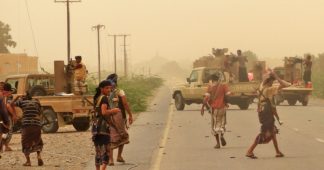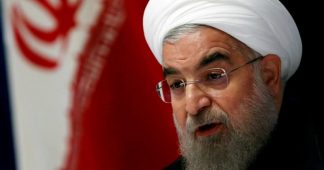An all-out military confrontation between forces in Yemen and Israel seems all but inevitable in 2021 reports Ahmed AbdulKareem
by Ahmed Abdulkareem
Jan. 4, 2021
ADEN, YEMEN — Saudi Arabia has rung in the new year in a familiar way, with an airstrike targeting a large gathering of civilians at a wedding ceremony in Yemen. On new year’s night, at least five civilians were killed when Saudi-backed militants launched artillery rounds at a wedding ceremony in the populated al-Hawk area in the strategic port city of Hodeida.
Developments taking place across the Middle East are driving the reality home in Yemen that 2021 is unlikely to bring about an end to Saudi Arabia’s nearly six-year-long war on their country. Signs of escalation are beginning to surface gradually in the Yemeni interior and along the Red Sea in the wake of the wave of normalization between the Gulf states and Tel Aviv.
After nearly six years of war, Yemen remains home to the world’s largest humanitarian crisis. Millions are hungry and destitute and at least 80% of the population requires humanitarian assistance or protection. Some 13.5 million people face severe food shortages and that number could rise to 16.2 million in 2021, according to International Relief Bodies. The Food and Agriculture Organization of the United Nations (FAO) raised the alarm about millions of Yemenis risking falling into worsening levels of hunger by mid-2021. The United Nations World Food Programme (WFP) also described the crisis in Yemen as “the world’s worst.”
The Saudi blockade on what was already one of the poorest countries on earth has entailed tight control over all aspects of life in Yemen since 2015, however, there are no indications that the Saudi blockade of Sana’a International Airport and Hodeida port will be lifted, the most important air and land ports in the country, and the cause of more Yemeni deaths than Saudi airstrikes, especially in light of the Covid-19 pandemic.
An Israeli blitzkrieg
On the ground, signs of escalation are expected to intensify during 2021 as an open military confrontation between Yemen and Israel seems closer than ever in the wake of recent Israel statements, including the statement of the spokesman for the Israeli military, Brigadier General Hidai Zilberman, who revealed to a Saudi website on Saturday the intention of his forces to launch a blitzkrieg in Yemen, confirming that Israel has been monitoring the situation in Yemen and Iraq. The Yemeni people fear that they will pay the price for tensions between Iran and the United States, according to many Yemenis who spoke to MintPress.
Zilberman said in an interview with Saudi news website Elaph that the regime in Tel Aviv expects that an Iranian attack could come from Yemen and Iraq. He referred to Yemen as “Iran`s second circle after Lebanon and Syria.” The recent remarks came after a similar statement made in October by Benjamin Netanyahu. The Israeli Prime Minister claimed that Iran sought to strike Israel from Yemen using surgical missile strikes.
According to information obtained by MIntPress and confirmed by Yemeni government officials in Sana’a, arrangements, and coordination have been underway between Israel and the Gulf states to escalate the situation in Yemen and justify it as a reaction to an expected Iranian retaliation for the assassination of Iranian scientist Mohsen Fakhrizadeh and the commander of Iran’s Quds Force, Qassem Soleimani, who is revered as a heroic warrior across Yemen. Soleimani was assassinated on January 2020 in a U.S. airstrike at Baghdad’s international airport.
This information has been confirmed by Jalal Al-Ruwaishan, Deputy Prime Minister for Security and Defense Affairs in the Sana’a government when he told local media that Israel began moving military equipment into the region after the recent normalization with Gulf states, including countries participating in the coalition,” referring to the UAE and Bahrain. He added, “what they failed to accomplish within six years, they will not be able to accomplish in a month, even in Biden era.”
Major General Abdullah Al-Hakim, the head of Military Intelligence in Sana’a, said in a statement that the Yemeni Army based in Sana’a is “monitoring the actions and provocations [of Israel] and its planned hostile actions.” Our eyes are not oblivious to the actions of the Zionist enemy in the region,” he said, “and they must understand the seriousness of our warning that any temerity or reckless actions will have dire consequences on Tel Aviv.”
The threat of all-out war
A high-ranking official in the Sana’a-based Yemeni Foreign Ministry told MintPress that any Israel attacks or war against Yemen would spark an all-out war in the Middle East and that Israel would be the first to suffer, adding that Israel interests and those of its allies in the Red Sea region would become a legitimate target within the framework of the right of self-defense guaranteed by all international conventions and agreements.
Any Israeli military action in Yemen would undoubtedly lead to an escalation in the region. In the wake of the announcement of Israeli intentions, statements issued by Yemen’s leaders warned of retaliatory attacks on Israel, in the Red Sea, and anywhere else in the region. Given the tone of officials in Sana’a when speaking to MintPress and the fact that the Houthis have not shied away from following through with retaliatory missile and drone attacks on targets in Saudi Arabia and the UAE, in addition to the volume of field preparations being made for an open and painful confrontation with Israel, the prospect of Houthi missiles raining down on Israel is very real.
Even to those living in areas under the total control of the Saudi-led Coalition, 2021is not likely to ferry in an end to their suffering, as wealthy Gulf monarchies live up to their storied reputations, wreaking havoc and instability, according to residents of those areas who spoke to MintPress in the wake of the violent explosions that struck recently Aden International airport and Al-Maasheeq Presidential Palace.
Last Wednesday, a large explosion struck the airport in the southern Yemeni city of Aden, run by forces affiliated with the UAE-backed militant group, the Southern Transitional Council (STC), shortly after a plane carrying “the Yemeni government,” which had been newly formed in Ryadh, landed there. At least 25 people, including officials, were killed and 110 were wounded in the blast. Moments after the attack on the Aden International Airport, blasts struck Aden’s Al-Ma’asheeq district, where just moments earlier the newly-formed government was transferred.
Although Saudi Arabia’s allies accused the Houthis of the attacks, and the Houthis categorically rejected the accusation. The attacks came after factions affiliated with the Southern Movement loyal to the UAE pledged to thwart the self-proclaimed cabinet after they returned to Aden from Ryadh where they were mostly working under enforced detention.
Under Biden, the bombs will keep coming
Most in Yemen are condemned to a gloomy future, not only due to the developments on the ground but also because of the flurry of approvals given by the United States to both the Saudi-led Coalitions and Israel. Approvals for arms sales have been given to Saudi Arabia and the UAE. countries with an appalling record of human rights abuses who are still launching a war against the poorest country in the Middle East.
These approvals, which will likely go ignored by Congress despite a growing revolt to the sales from the U.S. public, include $290 million worth of bombs, a final gift by President Donald Trump’s administration. On Tuesday, the State Department’s defense security cooperation agency approved the sale of GBU-39 small-diameter bombs to Saudi Arabia. The approvals also include the proposed $65.6 million sale of advanced drones and F-35 fighter jets to the UAE, a reward for that country’s normalization of ties with Israel.
Incoming president Joe Biden has expressed some opposition to Saudi Arabia’s malign actions in Yemen, but most Yemenis see little chance that 2021 will bring positive changes by Biden given the current geopolitical reality in the Middle East. That reality includes the sanctity of the U.S. relationship with Israel, Saudi funds, and fever of normalization between Arab countries and Israel sweeping across the Middle East and perhaps most importantly, the ongoing obsession from concurrent U.S. administrations and from Riyadh and Abu Dhabi with trying to contain so-called “Iranian influence” in the Middle East and linking the war in Yemen with that effort.
Regardless of who was behind actually the recent explosions in Aden, there are obvious signs of escalation, meaning that war in Yemen will likely continue to escalate in 2021 and that more Yemenis will lose their lives, more people will become internally displaced, the spread of epidemics will continue unabated, more cities, hospitals, and schools will be destroyed, and millions of helpless families will be left with no means of sustenance.
Though there are international calls to end the war on Yemen as well as indirect talks between the Houthis and Saudi Arabia, few are holding out hope that they can bring an end to the bitter Yemeni war in 2021. Indeed, Saudi warplanes still regularly launch airstrikes across the northern regions of Yemen. On Thursday, at least 15 airstrikes hit populated areas in Sana’a, including the Sana`a International Airport, the Rima Hamid of Sanhan District, and Wadi Rajam in the Bani Hushaish District, east Sana’a. In retaliation for the ongoing war and blockade, the Houthi-allied Yemen Army, which possesses in its arsenal advanced military watercraft, threatened Saudi oil tankers on the Red Sea in the context of a military campaign that it launched two months ago in a bid to pressure the Kingdom to end its devastating war.
* Ahmed AbdulKareem is a Yemeni journalist. He covers the war in Yemen for MintPress News as well as local Yemeni media.
Published at www.mintpressnews.com











